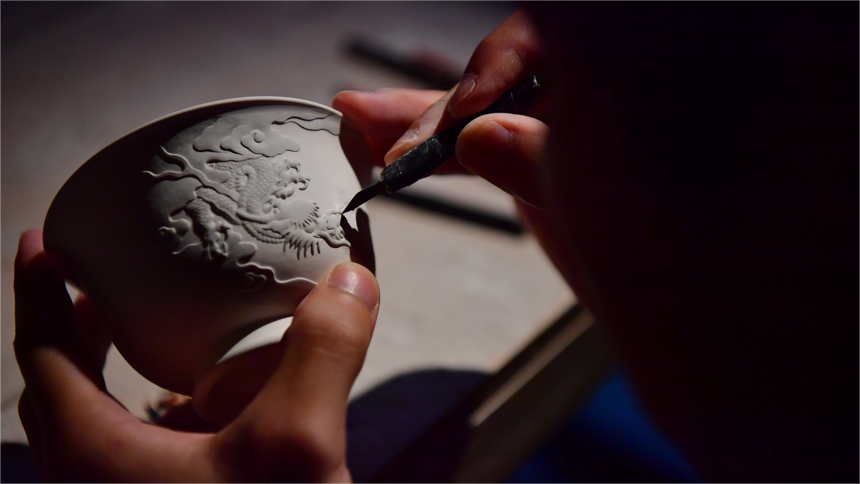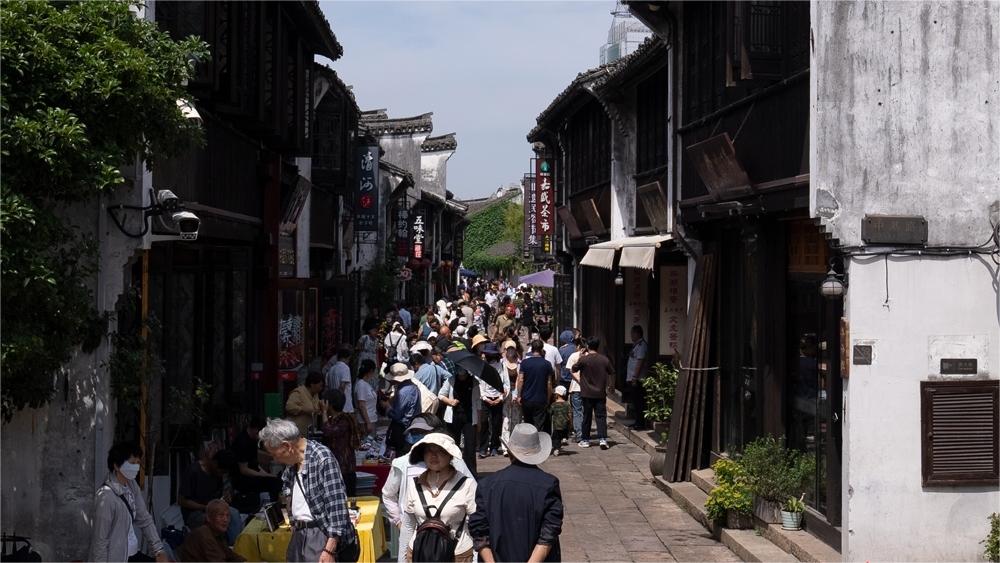Feature: Israeli military operation wreaks havoc on Jabalia camp in Gaza
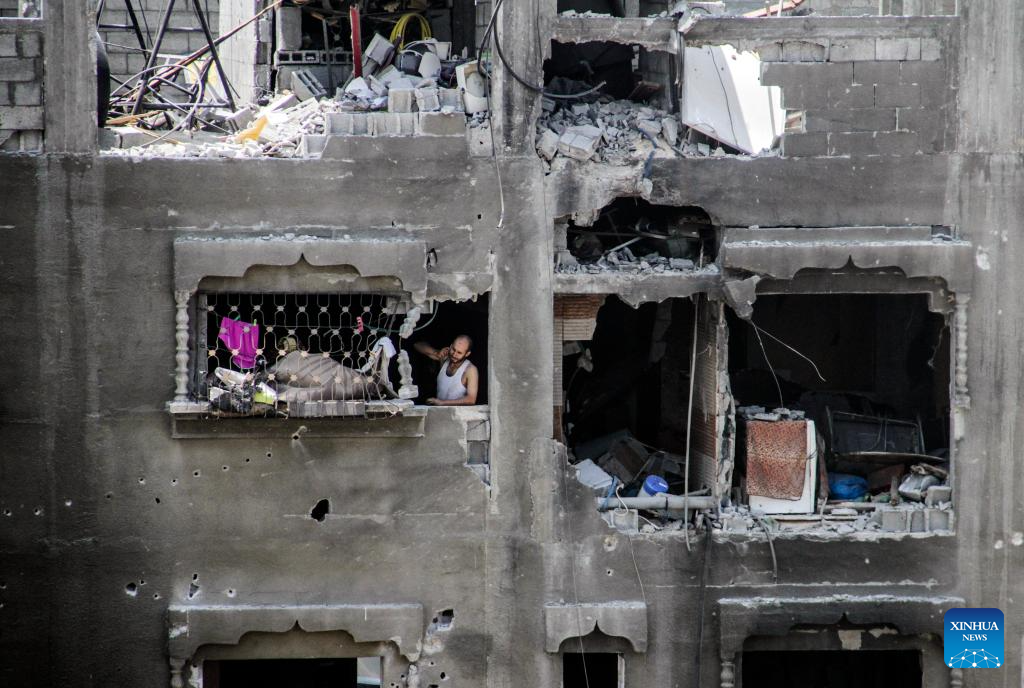
A man is seen in a destroyed building at the Jabalia camp in the northern Gaza Strip, on June 3, 2024. Days after the Israeli army withdrew from Jabalia camp in the northern Gaza Strip after nearly three weeks of military operation, Mohammed Omran, who returned to the camp, is still in shock due to the scale and intensity of destruction in his neighborhood. During the offensive, at least 50,000 housing units were destroyed. Meanwhile, most of the sewage networks and roads in northern Gaza were completely damaged, according to Naji Sarhan, head of the municipal emergency committee in northern Gaza. (Photo by Mahmoud Zaki/Xinhua)
GAZA, June 3 (Xinhua) -- Days after the Israeli army withdrew from Jabalia camp in the northern Gaza Strip after nearly three weeks of military operation, Mohammed Omran, who returned to the camp, is still in shock due to the scale and intensity of destruction in his neighborhood.
"We have nothing left here... No houses, trees, mosques, and even the UN agency schools that we used to take refuge during the war," Omran said in a voice breaking with emotion.
Due to the continued war in Gaza and the recent Israeli operation on Jabalia camp, the 45-year-old father of six, who has lost 30 kg of weight since the conflict began, has almost no will to live.
"The operation not only destroyed the infrastructure but also basic humanitarian services. The food and water are scarce and mostly polluted," Omran said. "I do not know where I should go. I have nothing left. I wish I could die to get some relief," he lamented.
However, some others were struggling to carry on with their shattered life. Among them was Amna Abu Jahal, who chose to stay in the camp after her husband was killed in the first week of the Israeli operation, despite the harsh conditions.
Every day, she had to spend many hours walking on foot to get a few liters of saline water to drink.
"The saline water was used for doing housework in the past, but now, we are forced to drink it," the 48-year-old mother of four told Xinhua, adding, "But I still feel lucky to find it."
"The Israeli attack was retaliatory. They even destroyed public water wells and sewage networks," she said.
Amjad al-Ghoul, another resident whose home was destroyed in the operation, was trying to set up a temporary tent beside the camp.
"All the shelters are overcrowded with displaced people, and the situation there became unimaginable... The sewage will lead to an epidemic," he said while trying to remove the wastewater surrounding his tent.
"What are the faults of children in all these? They survive the war, but they will die from diseases caused by environmental and health disasters," al-Ghoul said with distress.
On Friday, the Israeli army withdrew from the camp after ending its military operation aimed at eliminating Hamas' power there, according to army spokesman Avichai Adraee.
During the offensive, at least 50,000 housing units were destroyed. Meanwhile, most of the sewage networks and roads in northern Gaza were completely damaged, according to Naji Sarhan, head of the municipal emergency committee in northern Gaza.
Sarhan warned of an "imminent famine" in the camp, calling on the United Nations and other international organizations to "urgently intervene."
Israel has launched a massive military campaign against Hamas in Gaza to retaliate against a Hamas rampage through the southern Israeli border on Oct. 7, 2023, during which about 1,200 people were killed and more than 200 were taken hostage.
So far, the Israeli army has killed more than 36,000 Palestinians and wounded over 82,000 others in the enclave, most of them children and women, according to health authorities in Gaza.
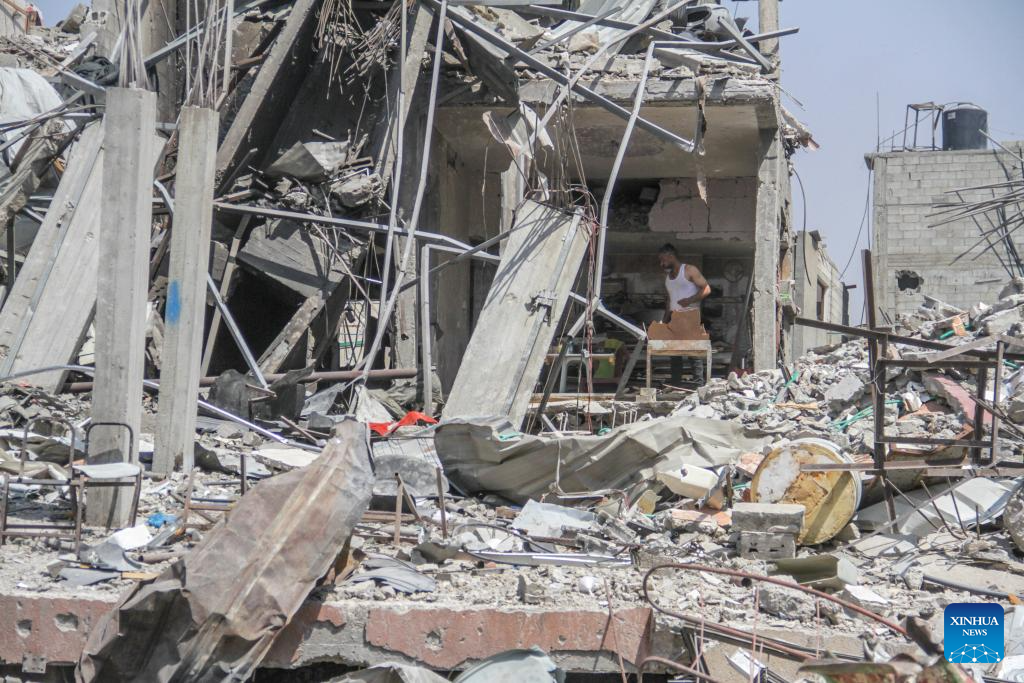
A man is seen in a destroyed building at the Jabalia camp in the northern Gaza Strip, on June 3, 2024. Days after the Israeli army withdrew from Jabalia camp in the northern Gaza Strip after nearly three weeks of military operation, Mohammed Omran, who returned to the camp, is still in shock due to the scale and intensity of destruction in his neighborhood. During the offensive, at least 50,000 housing units were destroyed. Meanwhile, most of the sewage networks and roads in northern Gaza were completely damaged, according to Naji Sarhan, head of the municipal emergency committee in northern Gaza. (Photo by Mahmoud Zaki/Xinhua)
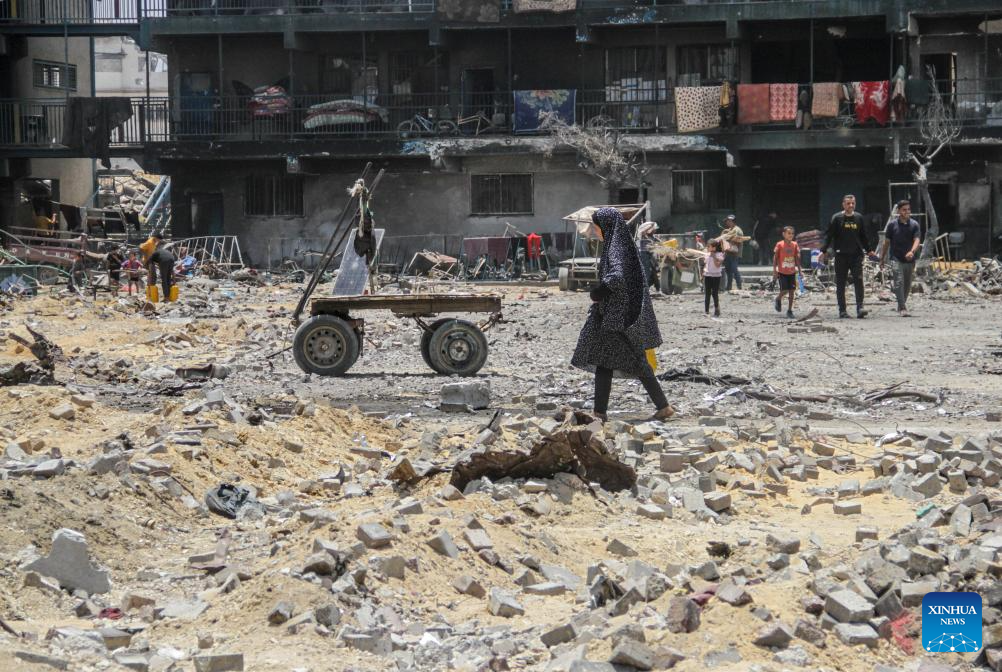
People are seen near destroyed buildings at the Jabalia camp in the northern Gaza Strip, on June 3, 2024. Days after the Israeli army withdrew from Jabalia camp in the northern Gaza Strip after nearly three weeks of military operation, Mohammed Omran, who returned to the camp, is still in shock due to the scale and intensity of destruction in his neighborhood. During the offensive, at least 50,000 housing units were destroyed. Meanwhile, most of the sewage networks and roads in northern Gaza were completely damaged, according to Naji Sarhan, head of the municipal emergency committee in northern Gaza. (Photo by Mahmoud Zaki/Xinhua)
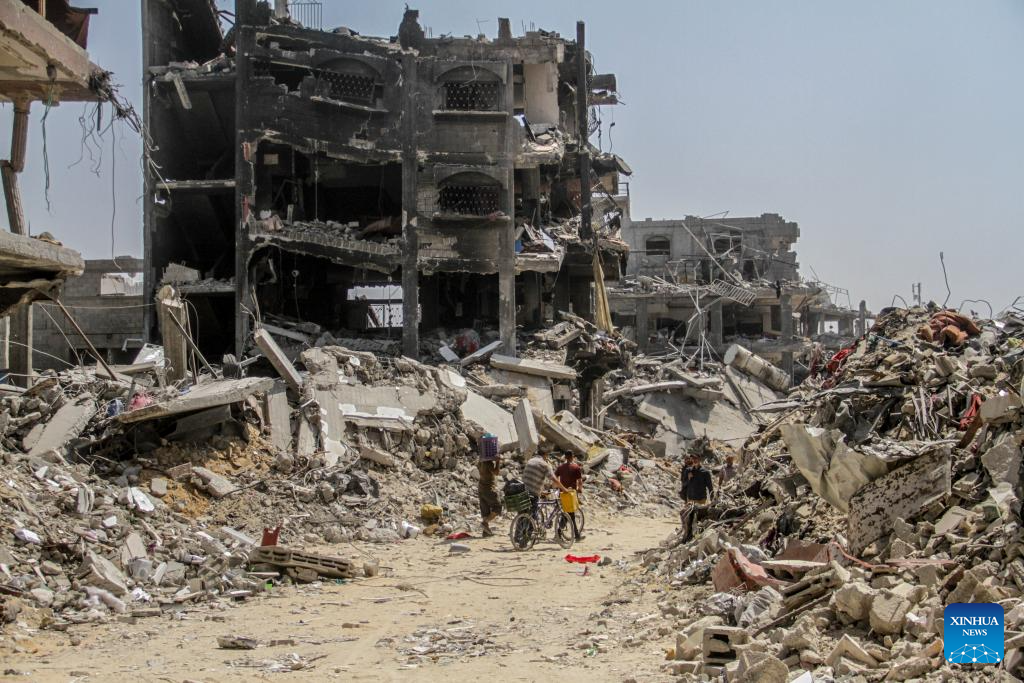
People pass destroyed buildings at the Jabalia camp in the northern Gaza Strip, on June 3, 2024. Days after the Israeli army withdrew from Jabalia camp in the northern Gaza Strip after nearly three weeks of military operation, Mohammed Omran, who returned to the camp, is still in shock due to the scale and intensity of destruction in his neighborhood. During the offensive, at least 50,000 housing units were destroyed. Meanwhile, most of the sewage networks and roads in northern Gaza were completely damaged, according to Naji Sarhan, head of the municipal emergency committee in northern Gaza. (Photo by Mahmoud Zaki/Xinhua)

People collect items from the rubble at the Jabalia camp in the northern Gaza Strip, on June 3, 2024. Days after the Israeli army withdrew from Jabalia camp in the northern Gaza Strip after nearly three weeks of military operation, Mohammed Omran, who returned to the camp, is still in shock due to the scale and intensity of destruction in his neighborhood. During the offensive, at least 50,000 housing units were destroyed. Meanwhile, most of the sewage networks and roads in northern Gaza were completely damaged, according to Naji Sarhan, head of the municipal emergency committee in northern Gaza. (Photo by Mahmoud Zaki/Xinhua)

People are seen in front of destroyed buildings at the Jabalia camp in the northern Gaza Strip, on June 3, 2024. Days after the Israeli army withdrew from Jabalia camp in the northern Gaza Strip after nearly three weeks of military operation, Mohammed Omran, who returned to the camp, is still in shock due to the scale and intensity of destruction in his neighborhood. During the offensive, at least 50,000 housing units were destroyed. Meanwhile, most of the sewage networks and roads in northern Gaza were completely damaged, according to Naji Sarhan, head of the municipal emergency committee in northern Gaza. (Photo by Mahmoud Zaki/Xinhua)

A tent is seen among the rubble at the Jabalia camp in the northern Gaza Strip, on June 3, 2024. Days after the Israeli army withdrew from Jabalia camp in the northern Gaza Strip after nearly three weeks of military operation, Mohammed Omran, who returned to the camp, is still in shock due to the scale and intensity of destruction in his neighborhood. During the offensive, at least 50,000 housing units were destroyed. Meanwhile, most of the sewage networks and roads in northern Gaza were completely damaged, according to Naji Sarhan, head of the municipal emergency committee in northern Gaza. (Photo by Mahmoud Zaki/Xinhua)

A woman walks past destroyed buildings at the Jabalia camp in the northern Gaza Strip, on June 3, 2024. Days after the Israeli army withdrew from Jabalia camp in the northern Gaza Strip after nearly three weeks of military operation, Mohammed Omran, who returned to the camp, is still in shock due to the scale and intensity of destruction in his neighborhood. During the offensive, at least 50,000 housing units were destroyed. Meanwhile, most of the sewage networks and roads in northern Gaza were completely damaged, according to Naji Sarhan, head of the municipal emergency committee in northern Gaza. (Photo by Mahmoud Zaki/Xinhua)
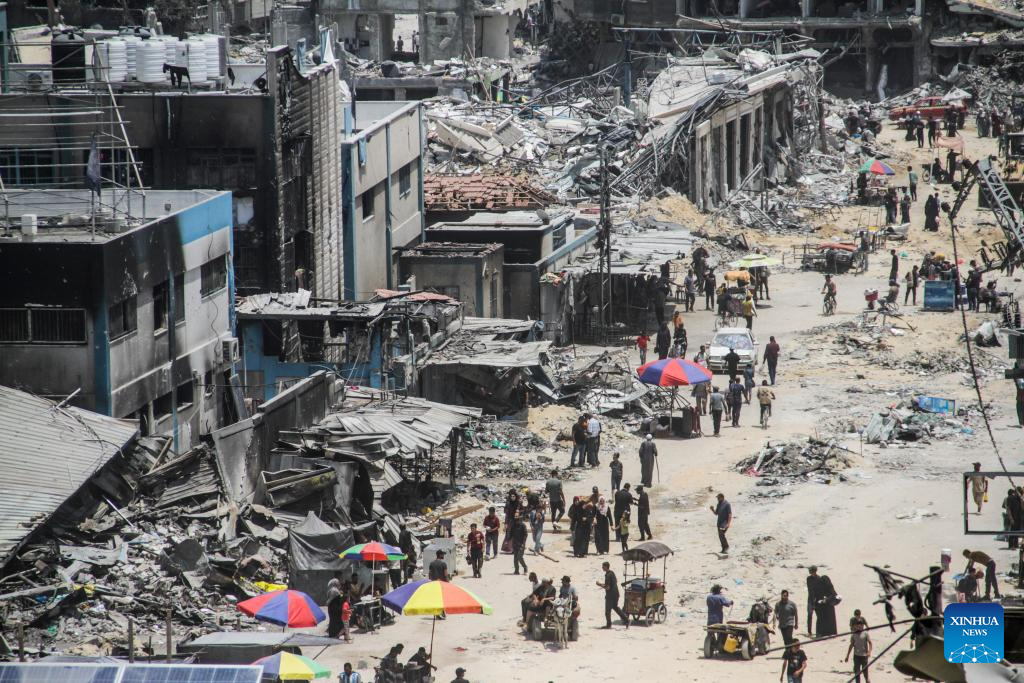
People are seen on a street with destroyed buildings at the Jabalia camp in the northern Gaza Strip, on June 3, 2024. Days after the Israeli army withdrew from Jabalia camp in the northern Gaza Strip after nearly three weeks of military operation, Mohammed Omran, who returned to the camp, is still in shock due to the scale and intensity of destruction in his neighborhood. During the offensive, at least 50,000 housing units were destroyed. Meanwhile, most of the sewage networks and roads in northern Gaza were completely damaged, according to Naji Sarhan, head of the municipal emergency committee in northern Gaza. (Photo by Mahmoud Zaki/Xinhua)
Photos
Related Stories
- Mideast countries, Islamic body condemn Israel's strikes on Rafah camp
- Israel confirms "shooting incident" at Egyptian border
- Israel says to stop work of Spanish consulate in Jerusalem for Palestinians
- Palestinian death toll in Gaza rises to 35,857: ministry
- Palestinians welcome UN court ruling on halting Israeli operations in Rafah
Copyright © 2024 People's Daily Online. All Rights Reserved.






